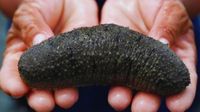The Indian Coast Guard (ICG) on Tuesday announced a significant seizure of 145 kilograms of sea cucumbers during an anti-poaching operation in Ramanathapuram, Tamil Nadu. Valued at Rs 58 lakh, this operation marks a crucial step towards combating illegal marine trade and protecting the marine ecosystem.
Sea cucumbers, classified as a Schedule I species under the Wildlife Protection Act of 1972, are strictly protected in India. Their harvesting and trade are illegal due to their vital role in maintaining ecological balance and biodiversity in ocean ecosystems. Despite the ban, sea cucumbers remain one of the most commonly smuggled marine species, often trafficked from the Indian coast to Sri Lanka and other Far Eastern countries, where they are considered a delicacy.
On April 13, 2025, the ICG Station in Mandapam executed the operation that led to the seizure. The coast guard took to the social media platform X, stating, "On April 13, 2025, Indian Coast Guard Station in Mandapam seized 145 kilograms of illegal sea cucumbers worth Rs 58 lakh during an anti-poaching operation. A major step towards safeguarding our marine environment and curbing illegal transshipment." This statement underscores the coast guard's commitment to protecting marine life.
The timing of this operation is particularly noteworthy, as it followed closely behind another significant anti-smuggling mission conducted by the ICG and the Gujarat Anti-Terrorist Squad (ATS). On April 14, 2025, these agencies worked together to seize 300 kilograms of narcotics, suspected to be methamphetamine, valued at an astonishing Rs 1,800 crore. The drugs were reportedly dumped into the Arabian Sea by smugglers who fled across the International Maritime Boundary Line.
According to an official statement from the ICG, the joint operation took place near the International Maritime Boundary Line in the Arabian Sea off the Gujarat coast during the night of April 12 and 13. The seized narcotics have since been handed over to the Gujarat ATS for further investigation, highlighting the ongoing efforts to crack down on illegal activities in the region.
The ICG's recent operations reflect a broader commitment to safeguarding India's marine resources and ecosystems. Sea cucumbers play a critical role in the ocean's health, contributing to nutrient cycling and serving as a food source for various marine species. The illegal harvesting of these creatures not only threatens their populations but also disrupts the delicate balance of marine ecosystems.
Despite the legal protections in place, the demand for sea cucumbers continues to drive illegal harvesting. Smugglers often employ covert routes to transport these marine animals to markets where they fetch high prices. The situation is exacerbated by a lack of awareness among consumers regarding the ecological implications of their choices.
The Indian government has been taking steps to enhance enforcement against illegal fishing and poaching. The ICG, in collaboration with various law enforcement agencies, has ramped up its efforts to monitor and control illegal activities in coastal and marine areas. This includes regular patrols, surveillance operations, and public awareness campaigns aimed at educating communities about the importance of marine conservation.
In addition to the immediate benefits of such operations, there is a growing recognition of the need for sustainable practices in marine resource management. Experts argue that fostering sustainable fisheries and aquaculture can help reduce the pressure on wild populations of sea cucumbers and other marine species.
As the ICG continues its work, the hope is that these efforts will not only reduce illegal trade but also promote a greater understanding of the importance of marine biodiversity. The recent seizures serve as a reminder of the ongoing challenges faced in protecting marine environments and the need for continued vigilance.
Overall, the seizure of 145 kilograms of sea cucumbers represents a significant victory in the fight against illegal poaching and trafficking of marine species in India. It highlights the crucial role that law enforcement plays in safeguarding natural resources and ensuring the sustainability of marine ecosystems for future generations.
As authorities remain vigilant, the public is encouraged to support conservation efforts by being informed consumers and advocating for sustainable practices in marine resource management. With continued collaboration and commitment, there is hope for a healthier marine environment and the protection of invaluable species like the sea cucumber.





